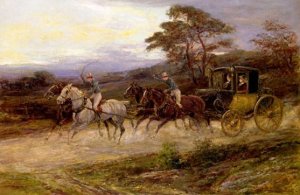Eleventh in the series We Want More Austen! about the less-known works of Jane Austen.
From a tender age Jane Austen had a gift for bringing us characters who expose their flaws through their own unreflecting utterances. Every time they open their mouths, her creations, from Mrs. Robert Ferrars to Sir Walter Elliot, give away far more than they intend. It’s one of Austen’s most delightful comedic talents.

Perhaps this is why, in her early years, she was so devoted to the epistolary form of storytelling—because everything is told in the characters’ own words. The unfinished tale “Lesley Castle,” written when she was sixteen, offers us a number of examples of this comic use of self-centeredness. The very first letter introduces us to Margaret Lesley, second daughter of Sir George Lesley. Writing about herself and her sister to her school friend Charlotte Lutterell, Margaret says, “We are handsome my dear Charlotte, very handsome and the greatest of our Perfections is, that we are entirely insensible of them ourselves.” Yeah, right. In a later letter to Charlotte she exclaims, “How often have I wished that I possessed as little personal Beauty as you do!” In Austenland, it seems, people are so focused on their own personal concerns that they have no attention to spare for the feelings of others.

But lest you feel bad for Charlotte, the unhappy recipient of these insensitivities, her first letter in the collection will ease your pain. Charlotte’s sister’s fiancé has just fallen from his horse and is not expected to live. Charlotte’s reaction? “Imagine how great the Dissapointment must be to me, when you consider that after having laboured both by Night and Day, in order to get the Wedding dinner ready by the time appointed, after having roasted Beef, Broiled Mutton, and Stewed Soup enough to last the married Couple through the Honey-moon, I had the mortification of finding that I had been Roasting, Broiling and Stewing both the Meat and Myself to no purpose.” Well, at least she was working hard for her sister’s happy day, right? Not exactly. Turns out food is Miss Charlotte Lutterell’s obsession, the alpha and omega of her existence. Planning to one-up her sister, “I was as cool as a Cream-cheese”; she describes her sister’s face as “White as a Whipt syllabub”; and she and her mother sit by her sister’s bedside, while the sister is having convulsions, calmly debating how they will dispose of all the food she has prepared.
In fact, the whole point of “Lesley Castle” seems to be exploring the variety of ways people can be selfish. Margaret Lesley’s brother has dumped his two-year-old daughter on his sisters after being left by his wife, and has decamped for a tour of the Continent. Their father leaves them all alone in his Scottish castle while he disports himself in London, remarrying without telling them of his plans and dissipating their inheritance. His new wife, who seems to be a precursor to the Lady Susan of Austen’s later epistolary work, is equally spendthrift and spends her time obsessing about who is prettier than whom.

The story has little plot. A bewildering array of characters is introduced but little happens to them; many unrelated people are discovered to be connected to one another in implausible ways, but nothing comes of these connections. No strong themes emerge before the fragment comes to an abrupt end. Still, it’s worth a read for the array of human frailties so relentlessly and hilariously exposed. I can easily see “Lesley Castle” providing inspiration to a writer of Austenesque fiction on the hunt for fresh material.

And personally, I love it for giving us one of my favorite sentences in all of Austen, her most masterful deployment of the rhetorical device of syllepsis: “the Worthless Louisa left him, her child & reputation a few weeks ago in company with Danvers & dishonour.”
Abigail Bok is the author of the short story “A Summer in Sanditon” in Sun-Kissed: Effusions of Summer and of the novel An Obstinate, Headstrong Girl.

sophiarose
Ha, that Charlotte. I love that you’re highlighting these minor stories so I can learn to appreciate them.
Abigail Bok
Well, they are certainly all the very reverse of romantic! Clever and vicious, without the humanity that gives her novels more grace. As to Charlotte, I do wonder whether JA had certain associations with certain names. I was thinking how prosaically domestic this Charlotte is, like but not like Charlotte Lucas. I feel that JA did take pleasure in making obscure reference to characters and scenes from her “private” writings in her “public” ones.